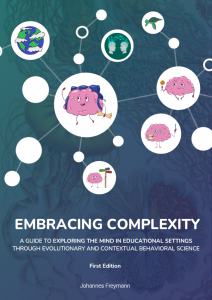Discoverer, Noticer, Advisor, Valuer
Resources on the DNA-V model
Psychologists Louise Hayes and Joseph Ciarocchi have developed the DNA-V model.
It contains the metaphors of the “Discoverer“, “Noticer“, and “Advisor” as well as the “Valuer”, to help humans be aware of, make use of, and practice different skills towards valued living.

Embracing Complexity
A guide to exploring the mind in educational settings through evolutionary and behavioral science
The Discoverer
- Function: To increase our possibility for new behaviors and understandings through trial-and error learning
- Evolutionary origins: The discoverer originated about 500 million years ago and we have it in common with many animals – many animals have a motivation to explore their surrounding. Apes in particular seem to have elaborated motivations to explore and try out new ways of doing things.
- Developmental origins: We are born with the discoverer. The fact that we humans like to play shows the activity, curiosity and imagination of our discoverer-mode. In childhood and youth, our discoverer is particularly active and willing to take risks. Even in adulthood, we still like to play, have hobbies, travel, read books, and want to try new things, just because we enjoy the discovery mode. Each of us has her own discovery mood that motivates us for certain activities, and in some it is more, in others less active.
- The discoverer can make use of the noticer and advisor, and can travel in space and time.
See also: Creativity
The Noticer
- Function: To detect physical, psychological, and environmental stimuli in the immediate here-and-now
- Evolutionary origins: The noticer is evolutionarily very old, depending on how one defines “sensing” and “perception”.
- Developmental origins: We are born with the noticer, but it also develops over our lifetime, being able to notice more and more different things.
- The noticer is automatic (System 1), but can also be consciously controlled by us (System 2). For example, if we want, we can notice a sensation in our left foot (or another part of the body) exactly RIGHT NOW, or observe sounds from the environment, or watch our breath, or observe if our mind is also “elsewhere” (see Mental Time Travel), or we can perceive/observe what our inner voice (the “advisor”, below) wants to tell us. Our noticer therefore does not travel around in space and time, but always perceives everything in the here-and-now.
The noticer or observer is related to our ability for “mindfulness”.
Mindfulness is a concept that many people talk about, including in sustainability education.
But what exactly is “Mindfulness”? What do you associate with this term? How would you define it?
In this video, Russ Harris tells you about five “Mindfulness Myths”, or misconceptions.
Has your own understanding of mindfulness changed after watching the video? If so, how?
The Advisor
- Function: To use prior learning, experience and language in order to learn from experience, simulate possibilities, and reduce the need for trial-and-error learning
- Evolutionary origins: The advisor may be an evolved trait unique to humans (because of our ability for symbolic thinking).
- Developmental origins: The advisor develops across our lives through relationships with other people and language learning. The things that people say or otherwise communicate to us in the course of our development, and the things we say/communicate to other people, become the repertoire from which our advisor continually builds our thoughts in unlimited combinations.
- The advisor is influenced by fast thinking (System 1), but it can also be controlled by us sometimes and to some degree (System 2). It often travels around in space and time. It does a lot of judging, evaluating, looking for causes and patterns, predicting.
See also: Symbols and Language
The Valuer
- Function: To select and reinforce behaviors that serve our well-being
- Evolutionary origins: Human values have some origin in our evolutionary history. Humans tend to value similar kinds of things.
- Developmental origins: Values are also unique to each individual and are shaped by experiences in our development.
- We are many ways that we can identify, reflect, and practice our own values.
See also: Human needs, values, and well-being

Exploring values
This lesson is about exploring the concept of values with students and having them identify and reflect on what they personally value, or what makes their life meaningful.
References
- Ciarrochi, J & Hayes, L. (2018). Shaping DNA (Discoverer, Noticer, and Advisor): A Contextual Behavioral Science Approach to Youth Intervention. In: Wilson, D.S. & Hayes, S.C. Evolution and Contextual Behavioral Science (S. 107-124). Oakland: Context Press.
- Hayes, L. L., & Ciarrochi, J. (2015). The Thriving Adolescent. Using Acceptance and Commitment Therapy and Positive Psychology to help teens manage emotions, achieve goals, and build connections. Oakland, CA, USA: Context Press.


